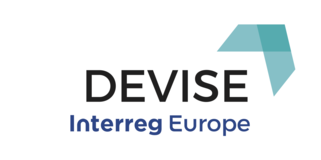DEVISE’s virtual trip to explore additional activities continues in the city of Donostia / San Sebastián (Basque County, ES), where project partners from Fomento San Sebastián (FSS) tell us more about the findings and results of the recently concluded COVID-19 Regional Context Assessment in relation to digital transformation of targeted SMEs and one successful COVID-19 good practice identified.
FSS has addressed 2 sectors for the COVID-19 Regional Context Assessment: retail and hospitality. Our partner Lourdes Blanco explains that the structural transformation process was sustained by three major transitions that have had a major impact on retail and the urban economy: digital transition, accelerating the change in the ways of producing, consuming and relating; environmental transition, questioning the traditional forms of energy and opening a transformative process in the production, mobility and social values of consumption and associated lifestyles; and, social and health transformation, with an accelerated aging of the population and a health awareness with high incidence in consumption. “In this context of ‘sectoral and social transformation’ that was already taking place, the pandemic has acted as an accelerator and intensifier of the process of change in the urban retail and hospitality sectors”, adds Lourdes.
Our partner highlights that the impact of the pandemic has brought two kinds of impacts. On the one hand, those which have brought various business difficulties (e.g., for sales, time restrictions, closures, and job losses). On the other hand, FSS has collected the “positive” ones as well: activating and accelerating a process of raising awareness of the need for digital transformation and competitive change.
FSS shares the two main conclusions derived from the impact of the pandemic. The first one would be that the public institutions pointed out the value of the urban retail and hospitality sectors from the perspective of competitive modernization. They have boosted a wide range of measures through generic and specific support instruments, such as, digitalization as a competitive tool; customized training, consultancy and tailored advice; economic grants for digital investments; and community building tools to generate positive effects in the digitization processes of the participants. The second conclusion is the digital transformation and competitive change of the companies by accelerating a process of awareness towards the technological transformation of retail and hospitality sectors. DEVISE partners from FSS mention that sales using online channels have increased; moreover, the online strategy of companies was reinforced, so they have been able to open e-commerce channels. They have also identified an increased awareness about digitalization (the digital as a tool for business competitiveness) and servitization (the adaptation of service to the customer needs as the greatest value). Furthermore, FSS points out a greater consumer awareness regarding health, safety, food and healthy living, and changes in the way of consuming and in the citizen perception of the local urban retail and hospitality. “We are talking about the relevance of local physical commerce in the life of the city, for example, sustainability, social cohesion, proximity and quality of life. Also, about the social and human dimension of the retail and hospitality as shopping and leisure experiences”, continues Lourdes.
Relevant Good Practice-Programme with Retail sector
As complementary to other existing programmes, adapted to the needs of the companies with a person-centric approach (to empower businesses owners and workers with new skills and tools) and collaborating with local Retail and Hospitality Associations, our partners highlight one specific local good practice: DSS Market Plaza, a municipal digital platform of services and sale of products of the retail sector of the city of Donostia / San Sebastián.
DEVISE project partner Gorka Díez explains that the main objective of this platform is the digitalization of the retail sector by offering a new publicly managed services and sales channel, as well as promoting training, growth and competitiveness in an environment of trust and local quality. “It was launched in July 2021 after a process of internal validation and collaboration with digital companies and professional associations, as well as programming and technical development”. According to him, this good practice has a double effect. It is a tool that directly supports digitalization processes (learning by doing), whereas it’s a public measure to directly support the competitiveness and the maintenance of business activity in the context of COVID-19.
He concludes that different stakeholders and beneficiaries have taken advantage of this good practice. After six months of implementation, he shares some positive insights, i.e., 202 businesses have permanently adhered offering more than 4,400 products for sale.











